Reporting Complexity: A U.S. Study Tour for Journalists from Central and Eastern Europe
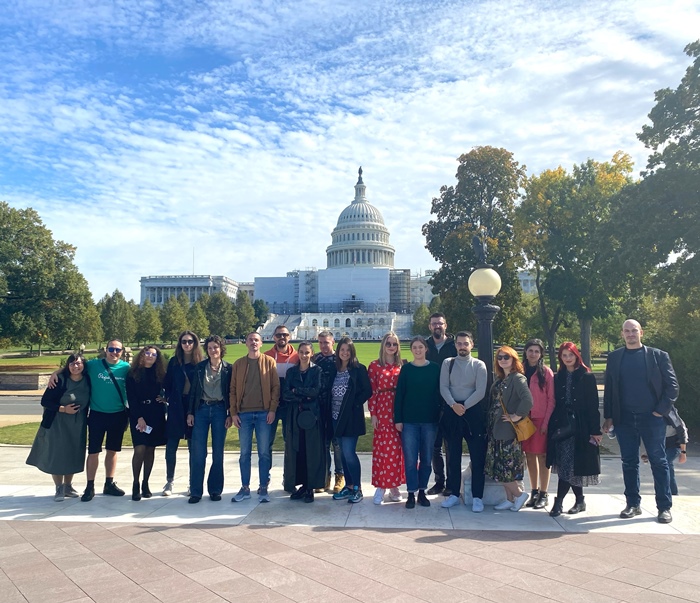
“Reporting Complexity: A U.S. Study Tour for Journalists from Central and Eastern Europe” is a joint undertaking of Fulbright Commissions based in Bulgaria, Czech Republic, Hungary, Poland, Romania, and Slovak Republic and U.S. Embassies in Albania, Kosovo, Moldova, Montenegro, Republic of North Macedonia, and Serbia. The program was sponsored and coordinated jointly by the Romanian-U.S. Fulbright Commission, the Bulgarian-American Commission for Educational Exchange, and the Polish-U.S. Fulbright Commission, with funding provided by the U.S. Department of State, and implemented by World Learning.
36 practicing journalists from 12 countries participated in the study tour in two cohorts: October 15 – 29 and November 5-19, 2022. The program consisted of a two-week learning experience in Washington, DC and New York City, aimed at building skills, knowledge and awareness related to reporting on complex issues.
What I liked most about this study tour was the well-made mix of everything: interesting topics, experienced journalists, inspiring places, new friendships and unforgettable experiences in the USA. Thank you very much!
Zuzana Hronová
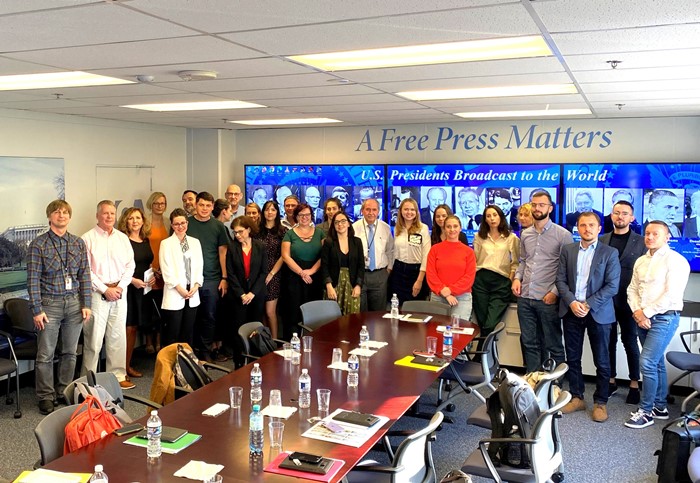
The participants had the opportunity to meet and discuss with experienced U.S. journalists and media representatives, to participate in custom professional workshops on science reporting and fact checking, to learn and share best practices for evidence-based quality journalism, and to discuss issues related to current challenges in the media landscape, countering disinformation, oversimplification, and ethical concerns surrounding complex topics.
Many thanks to Matt Brown and Izzy Fiore from World Learning for putting together the program in the U.S., accompanying the participants during their visits, and sharing some of the program’s highlights and photos.
I appreciated listening and sharing experiences with many experts from fields that media in my country usually doesn’t cover. Some of the lecturers were really creative and their thinking outside the box inspired me to do the same.
Miloš Rudović
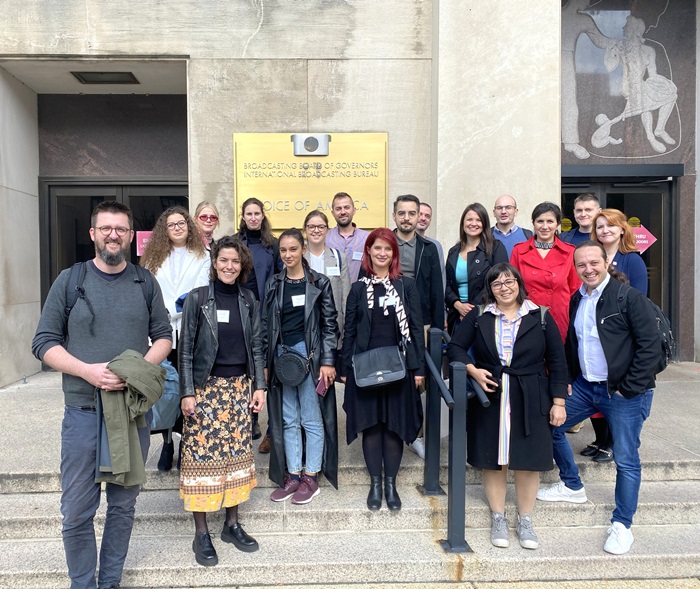
Both groups met with leading journalists from The Washington Post and The New York Times, and had the opportunity to discuss these journalists’ approaches to reporting complexity, as well as to learn about their careers and daily writing and editorial practices. Specifically, from The Post, the groups met with Mr. Ishaan Tharoor, a journalist who writes a Foreign Affairs opinion column out of the news desk four times per week, called “Today’s WorldView;” and with Mr. Devlin Barrett, a beat reporter who focuses on U.S. national security, the FBI, and corruption, and whose investigative articles are frequently on the front page. From The Times, the groups met with Ms. Hannah Seo, who writes on health and nutrition at the Well desk; and Ms. Sara Chodosh, the Graphics Editor at New York Times Opinion. Ms. Seo and Ms. Chodosh both previously wrote on science topics for the major magazine Popular Science.
Great opportunity to know American journalism standards and develop fact-checking skills. The diverse topics were very interesting and open to thinking outside of the box. Meeting with outstanding journalists and experts is always a source of inspiration and motivation. I come back to Poland with a ton of new ideas about how to improve my work, write better stories, and find new non-obvious topics. I’m very grateful that I could participate in the study tour Reporting Complexity.
Joanna Koprowska
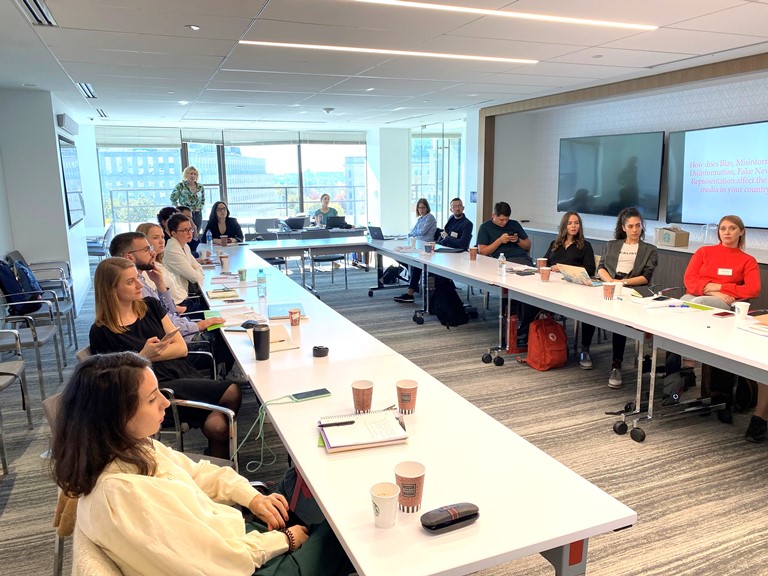
The participants met with Ms. Kate Shaw, one of three co-hosts of a popular podcast about the news and culture of the U.S. Supreme Court called “Strict Scrutiny,” to discuss perspectives on making this abstract institution accessible to general audiences. Ms. Shaw is a professor of constitutional law and Co-Director of the Floersheimer Center for Constitutional Democracy at Yeshiva University’s Cardozo School of Law, and also has significant media experience.
Both groups met with Ms. Fernanda Santos, who recently took on the role of Editorial Director at The Futuro Media Group, which produces mainly audio and digital products focused on the diverse Latino community in the U.S. Ms. Santos was previously a writer at The New York Times. She has fascinating perspectives as an activist journalist and an immigrant writer in the U.S. whose native language is not English (she was born in Brazil).
The program gave me an excellent insight into the current trends in journalism in the US and gave me the opportunity to learn about the techniques and tools that journalists in the US use to deal with similar challenges that we face.
Katarina Baletić
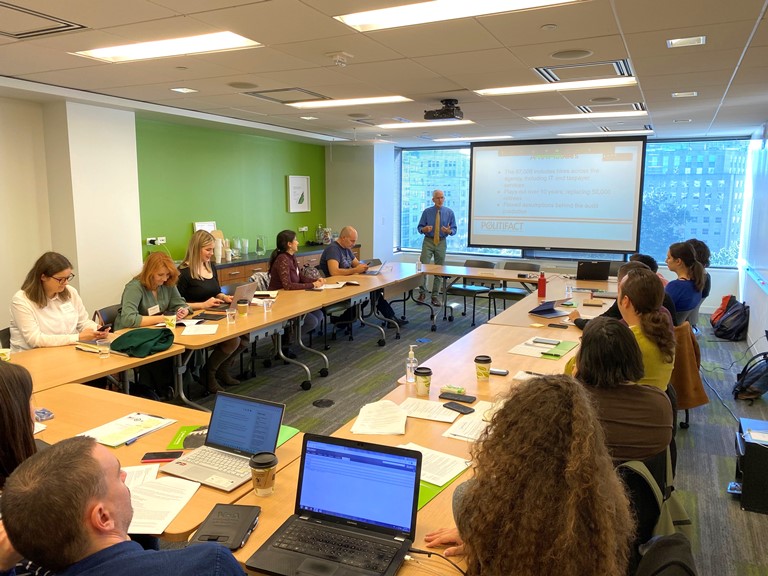
The journalists enjoyed three in-depth workshops focused on elements of scientific journalism, including a workshop about Reporting on Climate Change, with Mr. Scott Brinton, a veteran journalist and executive editor and currently a journalism professor at Hofstra University; and two workshops delivered by the Poynter Institute for Media Studies: one on fact checking, delivered by Poynter’s Politifact, the other on science and pandemic reporting, delivered by Poynter’s MediaWise.
The most interesting to me were the experienced journalists who shared first-hand the experiences and challenges they encountered during their careers, such as Washington Post journalist Devlin Barrett and columnist Ishaan Tharoor, as well as Charles Self, Tom Allon etc. Also, I consider the whole concept of disinformation and misinformation extremely useful, as well as everything that the Poynter Institute does and presents.
Ivan Ivanović
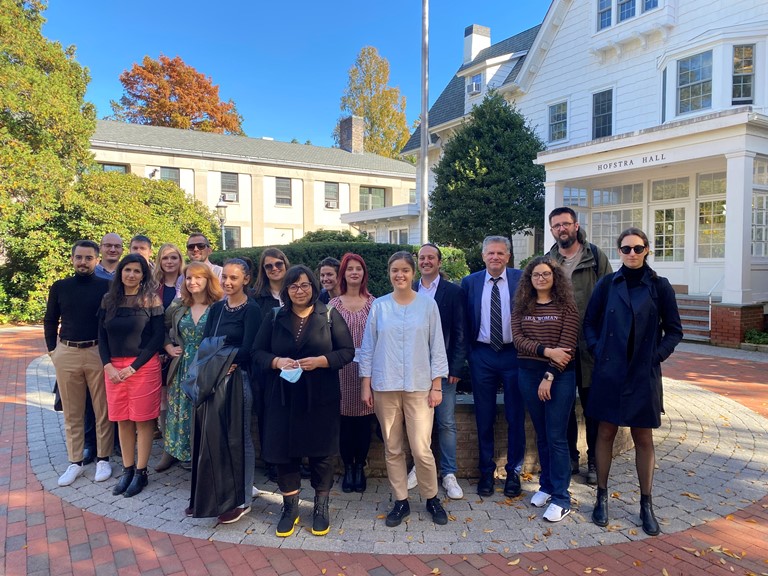
The programs also included a variety of cultural elements. One highlight for both groups was a visit to the nonprofit God’s Love We Deliver, a nonsectarian organization that prepares and delivers thousands of medically tailored meals each day to New Yorkers living with serious illnesses who are too sick to cook for themselves. The visit included a tour of the cooking and packaging facilities in SoHo as well as a conversation with organizational leadership.
The networking component of the program with both colleagues journalists from other European countries and with the U.S. speakers was very useful to me, personally and professionally. It was important for me, not surprising though, to see that the struggles I have in my country as a journalist – disinformation, oversimplification, mobility from mainstream media to independent media, financing of the media environment – are also the struggles of my peers from other countries. To see that the media landscape in the USA also confronted with these problems but found tools to tackle them in a way or another was of great importance for me. The access to information, data bases, tools for data journalism but more importantly, to the solutions found by them, is useful. We can learn the lesson, try to take what fits in our media landscape and try to win back the trust of readers.
Claudia Spridon
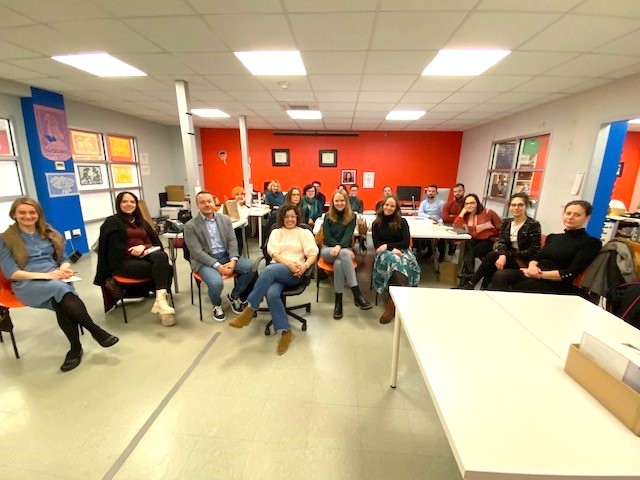
See links below for more details about the program and speakers.
Perhaps the greatest value was the chance to meet great journalists from our region who do a phenomenal job, thanks to which we can start cross-border cooperation.
Sylwia Czubkowska
Selected participants:
(in alphabetical order by country)
Group 1: October 15 – 29, 2022
- Fjoralba Sinoruka – Albania, Balkan Investigative Reporting Network (BIRN)
- Tsvetelina Sokolova – Bulgaria, Mediapool.bg
- Dimitar Stoyanov – Bulgaria, Bird.bg
- Andrea Procházková – Czech Republic, Týdeník Respekt
- Zuzana Vlasatá – Czech Republic, Deník Referendum
- Krisztián Szabó – Hungary, Atlatszo.hu Közhasznú Nonprofit Kft.
- Ádám Szoucsek – Hungary, Tudományos Ismeretterjesztő Társulat (Society for the Dissemination of Scientific Knowledge)
- Medina Kadriu – Kosovo, Kosovo Law Institute
- Mihaela Baltag – Moldova, ICS PRO Digital SRL
- Miloš Rudović – Montenegro, Center for Investigative Journalism of Montenegro
- Vasko Magleshov – North Macedonia, Balkan Investigative Reporting Network BIRN
- Sylwia Czubkowska – Poland, Spider’s Web
- Joanna Koprowska – Poland, ICAN Institute
- Mădălin Necșuțu – Romania, Balkan Investigative Reporting Network
- Claudia-Adriana Spridon – Romania, Panorama.ro
- Katarina Baletić – Serbia, Business Info Group (publisher of Nova Ekonomija)
- Otakar Horák – Slovak Republic, Denník N, N Press
- Kristína Votrubová – Slovak Republic, Postoj Media
Group 2: November 5 – 19, 2022
- Merxhan Daci – Albania, Euronews Albania
- Alexandra Ilieva – Bulgaria, Bulgarian National Radio
- Rosen Tsvetkov – Bulgaria, bTV Media Group
- Zuzana Hronová – Czech Republic, Deník.cz, Vltava Labe Media a.s.
- Jana Karasová – Czech Republic, Český Rozhlas (Czech Radio)
- Emese Dudics – Hungary, Central Médiacsoport Zrt.
- Zsuzsanna Farkas – Hungary, Freelance Journalist /Debrecen Reformed Theological University Doctoral School
- Fitim Gashi – Kosovo, Sbunker
- Iurie Sanduța – Moldova, RISE Moldova
- Ivan Ivanović – Montenegro, Nezavisni dnevnik “Vijesti” – Daily Press
- Suzana Miceva – North Macedonia, TRD TV channel VIS – Strumica
- Paulina Mozolewska – Poland, Agora S.A.
- Karolina Zbytniewska – Poland, EURACTIV Poland
- Bianca Albu – Romania, Buletin de București
- Georgiana-Adina Florea – Romania, Ringier Romania
- Dina Đorđević – Serbia, Center for Investigative Journalism of Serbia (CINS)
- Martina Bolibruchová – Slovak Republic, Zmudri, o.z.
- Eva Frantová – Slovak Republic, Petit Press, a.s.
I learned a lot about the US media landscape. I found out that there are many specializations in journalism that do not exist in my country like food journalism. I met 17 wonderful colleagues with whom we could collaborate on stories in the future. It was helpful to hear the experiences of journalists at the New York Times, Futuro Media, and many others.
Vasko Magleshov
I am really grateful for the high quality of the program! Everything concerning the logistics of the trip has been great and highly satisfactory. […] I have learned new things that have completely surprised me and I am generally very satisfied by the study tour!
Tsvetelina Sokolova
I appreciate all the busy journalists taking time to speak to us very openly and all the possibilities to get in touch with them even after the program. I feel like the US media landscape is a few years ahead of ours and now I can shape our project and work based on what I’ve seen and talked about during the program. What I found especially inspiring is the amount of NGO media that are successful in US and I feel like that could be our future, too.
Martina Bolibruchová
I believe that the professional sessions in Washington, DC and in New York City met all the objectives of the program. I sure developed my skills, learned tools for developing explanatory journalism products in a fact-based way, learned new skills about countering disinformation, learned how to approach difficulties and how to address the ethical concerns of complex topics. It was amazing to exchange practices with the speakers but also with the other participants and learned a lot from their critical background knowledge and their journalism skills.
Medina Kadriu
For me, the most interesting were the meetings with people dealing with science-related topics, since this is what I am interested in in my daily work. I was also greatly influenced by the personal stories of our speakers, who told how their careers were shaped over the years, what influenced changes in their priorities and how they managed to follow their values.
Paulina Mozolewska


